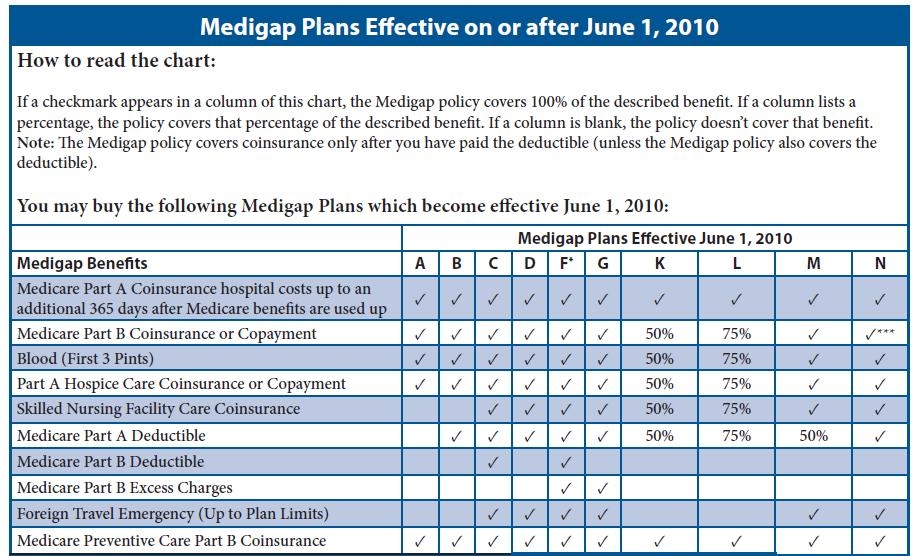Medicare Supplemental Insurance
Medicare covers a wide range of medical services, including hospital stays, doctor visits, and prescription drugs, but it doesn’t cover all of your expenses.
For this reason, many people choose to purchase Medicare supplemental insurance, also known as Medigap, to help cover the gaps in their Medicare coverage.
What is Medicare Supplemental Insurance?
Medicare supplemental insurance is a type of private health insurance that is designed to work alongside Medicare.
Medicare Supplement plans cover many of the out-of-pocket costs that Medicare Part A and Part B do not cover, such as:
- Deductibles
- Copayments
- Coinsurance
Medigap policies are sold by private insurance companies and are regulated by both federal and state laws to ensure that they provide the same benefits regardless of which company offers them.

How Many Medicare Supplement plans are there?
There are ten standardized Medigap plans, labeled A through N, each offering different levels of coverage. The basic benefits of each plan are standardized by law, so a Plan F policy purchased from one insurance company will have the same benefits as a Plan F policy purchased from another company.
However, the premiums for each plan may vary by insurer, so it is important to compare prices from multiple companies.
Medigap policies are only available to people who are already enrolled in Medicare Parts A and B. They cannot be used to cover the cost of Medicare Advantage plans, which are another type of private health insurance option that can be used instead of traditional Medicare.
One thing to keep in mind when considering Medigap coverage is that the policies only cover one person. If a married couple both want Medigap coverage, they will need to purchase separate policies. Often, there are household discounts available to help lower your monthly rates.
Additionally, Medigap policies do not cover long-term care, dental care, vision care, prescription drug coverage, hearing aids, or private-duty nursing.
Overall, Medicare supplemental insurance can provide important financial protection for those who rely on Medicare for their healthcare needs. They can help cover the costs that Medicare does not, providing peace of mind and potentially saving money in the long run. However, it is important to carefully consider your options and compare policies to ensure that you are getting the coverage you need at a price you can afford.
Do I need Supplemental Insurance if I have Medicare?
You are not required to have supplemental insurance while on Medicare, however, it’s important to know the risks of not having a Medigap policy.
Whether or not you need supplemental insurance if you have Medicare depends on your individual healthcare needs and financial situation. While Medicare covers many healthcare expenses, it does not cover everything, and some people may find that they have significant out-of-pocket costs even with Medicare coverage.
Medicare Supplemental insurance, also known as Medigap, can help cover some of these costs, providing additional financial protection and peace of mind.
One reason you may want to consider Medigap coverage is if you have frequent doctor visits or hospital stays. Medicare Part A covers hospital stays, but you may still be responsible for a deductible and coinsurance. Medigap plans can help cover these costs, potentially saving you money in the long run.
Similarly, if you frequently see doctors or specialists, you may have to pay copayments or coinsurance for these visits. Medigap plans can help cover these costs as well, reducing your out-of-pocket expenses.
Also, keep in mind that Medicare Part B, which covers doctor’s services, only pays 80% of your doctor’s bills. You are required to pay the additional 20%. A Medigap plan will pay the remaining 20% for you.
Another reason to consider Medigap coverage is if you have a chronic condition or require specialized medical care. While Medicare covers many healthcare services, it does not cover all treatments or therapies. Medigap plans may offer additional coverage for things like chemotherapy or dialysis, depending on the plan you choose.
Ultimately, the decision to purchase Medigap coverage is a personal one that depends on your individual healthcare needs and financial situation. If you have significant out-of-pocket expenses with Medicare coverage, or if you are worried about the potential costs of future healthcare needs, Medigap coverage may be a wise investment.
However, it is important to carefully consider your options and compare policies to ensure that you are getting the coverage you need at a price you can afford.
Medicare Supplemental Insurance Plans
While there are ten different Medigap plans to choose from, there are typically just a few different plans that most people enroll in.
Currently, Medicare Supplement Plans G, F, and N are the most popular plans. These plans provide excellent coverage with relatively low monthly premiums.
Read below to see a detailed description of each plan to help you decide which one is right for you.

Medicare Supplemental Plan F
Medicare Supplemental Plan F is one of the most comprehensive plans available for people with Medicare. It provides coverage for all of the out-of-pocket costs that Original Medicare does not cover, including deductibles, copayments, and coinsurance.
As a result, Plan F can provide significant financial protection for those who rely on Medicare for their healthcare needs.
The most important factor with Medigap Plan F is the fact that only people who were enrolled in Medicare prior to January 1st of 2020 may enroll in this plan. If you are new to Medicare then you should consider either Medicare Plan G or Plan N as Plan F is not an option for you.
Medigap Plan F also offers some additional benefits that are not available with other Medigap plans. For example, it covers the Medicare Part B deductible each year as well as coverage for foreign travel emergencies, which can be especially valuable if you travel frequently or if you are planning to travel abroad.
Overall, Medicare Supplemental Plan F can provide valuable financial protection for those who rely on Medicare for their healthcare needs. It offers comprehensive coverage for all of the out-of-pocket costs that Medicare does not cover, as well as some additional benefits that can be especially valuable for certain individuals. However, it is important to carefully consider other options such as Medicare Plan G, as Plan F is the most expensive plan and Plan G is very close in coverage.
Medicare Supplement Plan G
Medicare Supplement Plan G is one of the most popular Medigap plans that provide comprehensive coverage for out-of-pocket costs that are not covered by Original Medicare.
This plan is very similar to Medigap Plan F, with the only difference being that Plan G doesn’t cover the Medicare annual Part B deductible. However, by paying this deductible yourself on Plan G you will actually save quite a bit of money over Plan F.
One of the biggest benefits of Plan G is that it provides coverage for all of the out-of-pocket costs that Original Medicare does not cover, including coinsurance, copayments, and excess charges. This can be especially valuable if you have frequent healthcare needs or if you are worried about the potential costs of future healthcare expenses.
Another benefit of Plan G is that like all Medigap plans, Plan G is standardized. This means that the benefits are the same regardless of which insurance company offers the plan. This can make it easier to compare policies and find the one that is right for you.
Medicare Supplement Plan N
In exchange for lower monthly premiums, with Plan N you might have up to a $20 copay for some office visits and up to $50 for emergency room visits that do not result in an inpatient admission. These cost-sharing benefits can help to reduce the financial burden of medical expenses for individuals who are enrolled in Medicare.
Another benefit of Medicare Supplement Plan N is that it offers coverage for some of the services that Medicare does not cover, such as foreign travel emergency services. This coverage can be particularly important for individuals who travel frequently or who live outside of the United States for part of the year.
Medicare Supplement Plan N also offers flexibility in choosing healthcare providers. As with other Medicare supplement plans, Medicare Supplement Plan N does not require individuals to use a network of providers.
This means that individuals can choose any healthcare provider that accepts Medicare, which can be particularly beneficial for individuals who have established relationships with certain healthcare providers.
For those who are healthy but still want to have a high-coverage Medigap plan, Medicare Plan N just might be your best choice.
What is the Average Cost of Supplemental Insurance for Medicare?
The cost of supplemental insurance for Medicare can vary widely depending on the specific plan you choose, your location, and your age and health status. However, there are a few factors that can help give you an idea of the average cost of these plans.
The Rates for Medicare Supplemental Insurance are determined by:
- Age
- Zip code
- Tobacco use
- Gender
- Any applied household discounts.
One important factor to consider is the type of plan you choose. Plans that offer more comprehensive coverage, such as Plan F or Plan G, will generally have higher premiums than plans with less comprehensive coverage, such as Plan N. Additionally, plans that offer more flexibility in choosing healthcare providers may also have higher premiums.
Another factor that can impact the cost of supplemental insurance for Medicare is your location. Premiums can vary depending on the state and county you live in, as well as the insurance company offering the plan.
According to a 2021 report by the Kaiser Family Foundation, the average monthly premium for a Medicare Supplement plan in 2021 was $203. However, this average can vary widely depending on the factors mentioned above.
Overall, the cost of supplemental insurance for Medicare can vary widely based on those factors, but the coverage it provides can be well worth the investment for those who need additional healthcare coverage.
How to Apply for Medicare Supplemental insurance
To get started and apply for Medicare Supplement coverage, the easiest way is to call us direct at 1-888-891-0229.
Or to view rates now, simply fill out the form to the right and you can see rates for the most popular plans from some of the top insurance companies.
Our experienced licensed insurance agents make the process easy when it comes to shopping for Medicare Supplemental insurance. And we’ll check your rate every year to make sure you’re always paying the least amount possible for your coverage.



